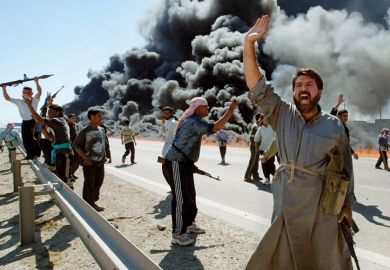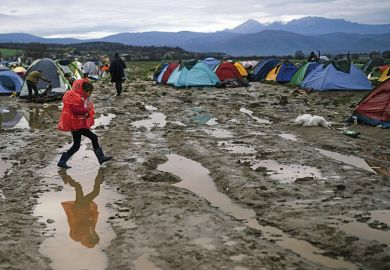When Islamic State began taking control of swathes of Iraq in 2014, seven universities were forced to shut. But 50,000 of the students displaced were welcomed by the University of Kirkuk, which provided support for them to complete their studies, a refuge from terror – some had fled with tales of people being drowned in cages by IS – and an alternative to the prospect of being forced to join the jihadists.
The remarkable achievements of Kirkuk, which had 26,000 students before its humanitarian expansion, won the university the Outstanding Support for Students category in the recent inaugural Times Higher Education Awards Asia.
Abbas Hassan Taqi, Kirkuk’s president, highlighted that a young university founded only in 2003 had played “a vital role in rescuing…students from IS gangs”, helping to address “big dangers for the whole world, not Iraq only”, given that students who remained in their home cities would have been potential recruits for IS.
“I don’t think there is any [other] university in the world that is capable of rescuing more than 50,000 students, hosting them, providing them with all the facilities, all the instruments in the labs, all the financial assistance, for…nearly four years,” he told THE.
The university opened its doors to students displaced from seven universities across three provinces of Iraq, including the universities of Mosul – Iraq’s second oldest institution – Tikrit, Anbar and Fallujah.
As IS rule wore on, increasing numbers of people sought to escape these provinces, often driven by horror at the “different, incredible ways of executing people” used by the jihadists, said Safwat Al-Bazzaz, head of the English department at Kirkuk and a member of the university’s team at the awards ceremony, which took place early this month in Abu Dhabi. “They [IS] were putting them in a closed cage [and] by use of a crane drowned them in a river…as we heard from our colleagues from the University of Mosul,” he added.
At the peak of its power, IS occupied about one-third of Iraq, encompassing territory with a population of 10 million.
The aim of IS “was to damage everything in Iraq”, said Dr Al-Bazzaz. “They know that the youth is the basic component of the society.” The choice that IS gave to young people was “either to join them or be punished”, he added.
To accommodate the influx of students, Kirkuk allowed its classrooms and labs to be used by counterpart departments from the seven institutions on its days of closure – Fridays and Saturdays – as well as at the end of normal working hours. Some Kirkuk professors worked after hours, without pay, to teach these classes.
Other displaced students were taught alongside Kirkuk students. The university’s libraries were opened to the newcomers. And the university constructed new buildings to cope with the expansion.
Students were provided with accommodation, often for free, and financial assistance as well as food thanks to donations. Some Kirkuk staff allowed displaced colleagues and students to live in their properties for free. Social events helped to combat any isolation the students, far from home, might feel and served “to raise their spirit”, said Dr Al-Bazzaz.
There was “a very successful and strategic plan to embrace all these students” that was supported by “a lot of administrative efforts to help them continue their studies”, he said.
“So instead of making [perhaps] 30,000 terrorists, we made 50,000 graduates,” he said. “This affects [Iraqi] society a lot. Instead of reinforcing the [IS] gangs, we reinforced education.”
Kirkuk is an ethnically diverse city, with a mixed population of Kurds, Arabs, Turkmen and Assyrians.
Iraq’s ethnic mix has often led to tension and violence. But Dr Al-Bazzaz said that different populations could live together peacefully in Kirkuk, pinpointing this as a factor that allowed the university to welcome students from a variety of ethnic backgrounds.
Friendships and “even marriages” have blossomed between students at Kirkuk as a result of its hosting the displaced, he said. Students from Mosul and Tikrit, and from Mosul and Kirkuk, were married after meeting at the university.
With the displaced students now graduated and the IS “caliphate” ended, Kirkuk has returned to its normal level of 26,000 students.
But the new buildings and a new spirit will leave a legacy for the university, the city and the region, said Dr Al-Bazzaz. “Our capability improved during this time, and our experience in teaching improved in this time,” he said.
The hosting of the displaced students happened while the city of Kirkuk itself was close to the front line of conflict. “Kirkuk was in danger,” said Dr Al-Bazzaz. “But Kirkuk citizens didn’t leave the city…even though sometimes we were hearing the sounds of explosions near Kirkuk. But because of the high spirit of the citizens, of the Kirkuk University students, we remained there. We were able to continue our mission and our study.”
POSTSCRIPT:
Print headline: ‘Instead of 30,000 jihadists, we made 50,000 graduates’
Register to continue
Why register?
- Registration is free and only takes a moment
- Once registered, you can read 3 articles a month
- Sign up for our newsletter
Subscribe
Or subscribe for unlimited access to:
- Unlimited access to news, views, insights & reviews
- Digital editions
- Digital access to THE’s university and college rankings analysis
Already registered or a current subscriber?








